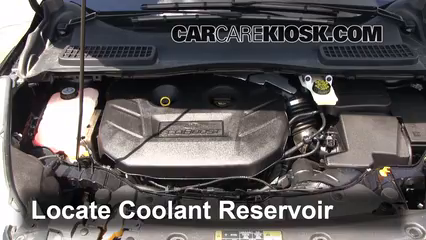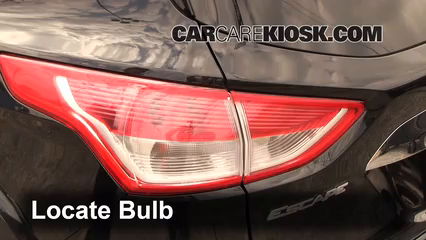How to Add Refrigerant to a 2013 Ford Escape SEL 2.0L 4 Cyl. Turbo
Ford Escape Model Years - 2013, 2014, 2015, 2016, 2017, 2018, 2019
Where the low pressure A/C port is on 2013 Escape and how to add add A/C Pro
Hans Angermeier is an ASE certified Maintenance and Light Repair Technician and has produced over 100,000 videos showing drivers how to fix things on their cars. He has broad expertise on basic repair procedures covering the majority of cars on the road. Over the past 10 years, Hans has been focused on building CarCareKiosk, which is visited by millions of drivers each month.
- Lake Chevy helped make these videos
- Feedback
- Download Ford owners manuals
When the air conditioner in your 2013 Ford Escape starts blowing hot air, you likely have a freon leak. Recharging the freon in your AC system is an inexpensive and easy first step to restoring the cooling capacity of your A/C system. Most refrigerants include a leak sealer that will seal small leaks in addition to filling the R134a freon. The A/C system in your Escape consists of a compressor that is belt-driven, an evaporator and freon. If there is a problem with your compressor or evaporator, adding freon will not restore cooling.
How do you recharge AC in a 2013 Ford Escape? The low side AC port location is the first thing to find when you are looking for how to put freon in a car. Once you find the 2013 Escape AC low pressure port cap, hook up the can of refrigerant to the low pressure port. When your compressor kicks on, add freon to the correct pressure. In addition to cooling, freon lubricates the compressor when it runs. Typically the AC recharge kit you buy will have enough capacity to add enough freon to get the AC in your Escape to blow cold air.
What type of refrigerant does a 2013 Ford Escape use? Air conditioning systems can vary so it is critical that you check the sticker in the engine bay to determine your Escape refrigerant type. There is an AC sticker in the engine bay of your 2013 Escape that indicates if it requires R134a refrigerant or the newer R1234YF type to do a recharge. You cannot add R1234YF refrigerant to a R134a system nor can you add R134a refrigerant to a R1234YF system. R134a and R1234YF have different low pressure port types, so you should never use a recharge adapter to add the wrong type of refrigerant. Recharging your Escape with the wrong type of freon can make the AC recharge cost much higher!
- Advance Auto coupon for
20% off entire order: KIOSK20













 STOP AND SEAL LEAKS
STOP AND SEAL LEAKS EXTENDS A/C LIFE
EXTENDS A/C LIFE PROTECTS AGAINST A/C WEAR
PROTECTS AGAINST A/C WEAR